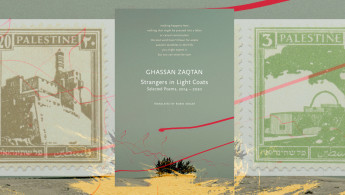Strangers in Light Coats: Palestinian poetry of time, memory, and exile by Ghassan Zaqtan
Ghassan Zaqtan’s poetry is synonymous with memory — and in his latest book, worlds collide and unfurl, then come back together bound by the presence of loss.
Strangers in Light Coats (Seagull Books, 2023) presents a selection of Ghassan's poetry in English, written between 2014 and 2020 from four different collections.
The book is sectioned into six parts, but the themes Ghassan invokes flow from one section to another, with loss becoming more powerful with each poem. As loss grows, so does memory.
Memory is bound by time, and it also transcends. For Palestinians, memory also exists within the confines of colonisation, which creates another dimension of time before which memory was free and unconstrained.
In Ghassan Zaqtan’s poetry, time and age merge as memory takes over, at times in a way that shifts the reader back to the past as if living it in the present. Both dimensions intertwine, and it is exile that shapes the poetry and guides the reader to understand the loss within. Emptiness accompanies exile, although the former is left behind, as Ghassan writes in his poem When That Happens:
‘He knows in his heart,
in a way of which he knows nothing,
that he has reached his land'
The horrifying scenes of Israeli colonial violence keep spreading through the poetry. It Rained in the Short and Treelined Street commences with recollections that soon branch off into darker memories; rain is no longer an accessory that embellishes a memory, but the force of the memory itself.
Likewise, the force of memory is felt in the poem The City Without Them where Ghassan ponders the fate of the exiles:
'What is happening to the distant homelands that fill their bedroom walls,
their battered wallets, their pitiful and gaudy flags, their anthems,
cruse and droning, imprisoned in terse phrasing and childish tunes?'
As a recurring theme, absence is conveyed in the poems through the inability to arrive at a destination. Evoking imagery of paths and trails, Ghassan describes a pursuit of travel “but we do not arrive.”
From absence, the poet moves on to emptiness – the inability to see, the incongruence of thought, the void of voices.
Emptiness, however, is also cloaked in memory. At times memory is evoked by names and death, at other times in echoes of life before devastation and its degeneration into death:
'White with death,
or climbing, leaning
as they went beneath the weight of memory.'
Perhaps one of Ghassan Zaqtan's most poignant reflections is the poem, The River Hymn where he pleads with nature to be kind to the displaced population and to bestow abundance. Yet, with the Nakba and the history of Palestinians’ forced displacement from their lands, the laceration between land and people runs so deep that no supplication can so far provide either sustenance or shelter.
Sustenance and memory are also invoked in the poem The Oars and the Trumpet and the Bridge where Ghassan writes: 'As we climbed, I swapped bread with her for memories.' The poem is also replete with movement.
Ghassan’s poems also narrate memory from other people’s perspectives, in a way that makes the memory seem both personal and collective:
'The woman whose husband the sniper we killed in the last war
was searching, like us,
for the road to the lakes.'
Palestine is not a vacuum despite the ethnic cleansing and its repercussions on the Palestinian people. Ghassan Zaqtan’s poetry elicits glimpses into a rich cultural heritage, as well as a connection with ancient and more contemporary history – links that are not severed despite exile.
And even though the Palestinian experience is still woven into the wider connection to the world, Ghassan illustrates the Palestinians’ sense of belonging to the world, even as death reeks around the corner.
In the Palestinian experience and Ghassan Zaqtan’s poetry, the Palestinian death is linked to life in a way that those who are left behind carry the trauma: 'Carried him like he was remembering,' he writes in the poem It Happened During The Mountain War.
Ghassan also writes about the normalisation of colonial violence, and how each aspect of settler-colonialism is linked to each other, while eliciting little to no response, or outrage: 'Just so, by force of habit.'
Like the rest of Ghassan Zaqtan’s poetry and prose, each read of this book will convey a deeper meaning.
The poet sculpts language to give life to all that is obscured in the Palestinian experience, and getting lost in such words only reveals the extent of their depth.
Ramona Wadi is an independent researcher, freelance journalist, book reviewer and blogger specialising in the struggle for memory in Chile and Palestine, colonial violence and the manipulation of international law
Follow her on Twitter: @walzerscent




 Follow the Middle East's top stories in English at The New Arab on Google News
Follow the Middle East's top stories in English at The New Arab on Google News


